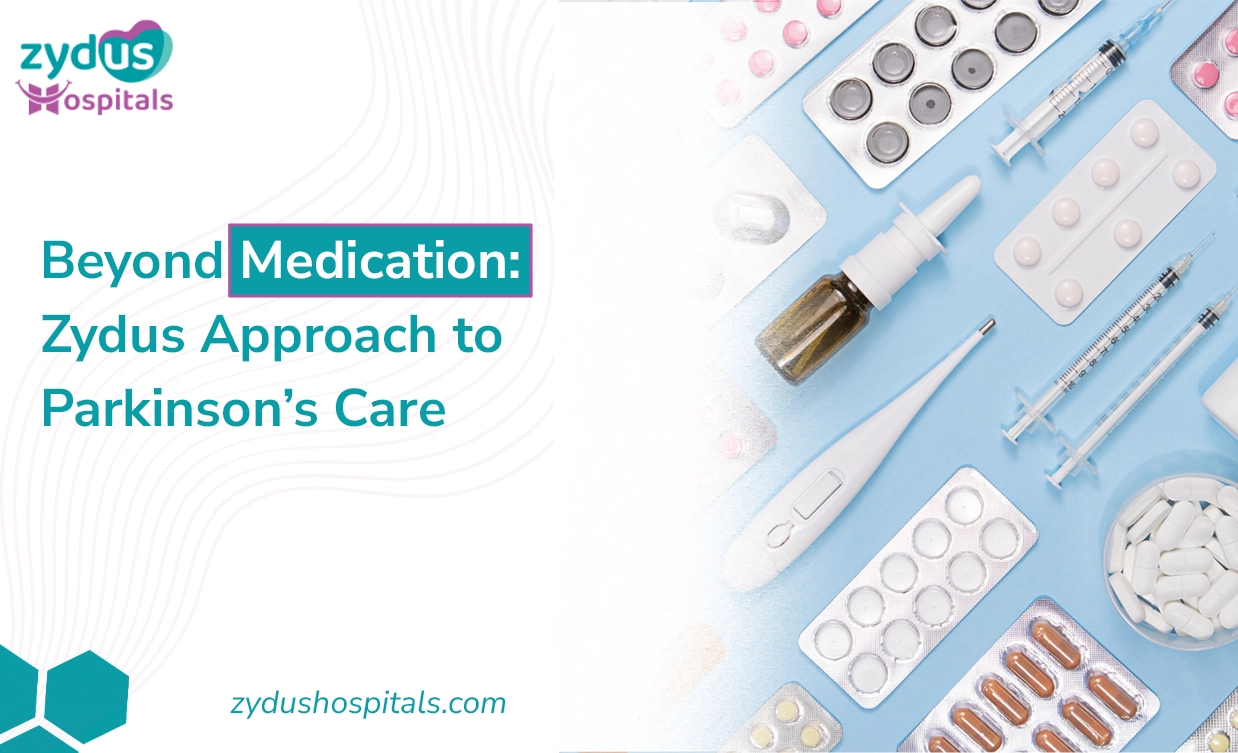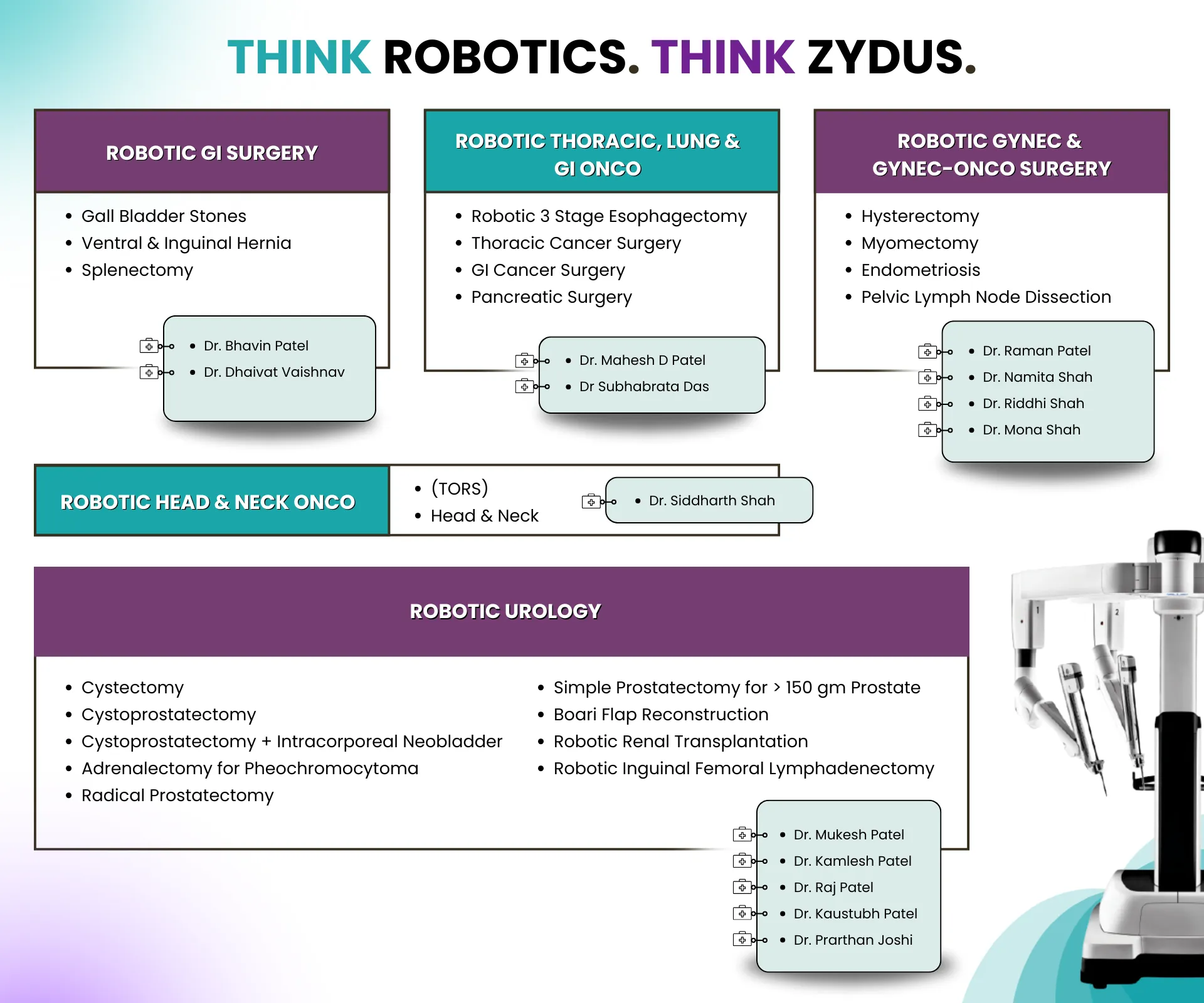Explore the full spectrum of care for Parkinson’s patients at Zydus Hospital
Introduction
The phrase, “You have Parkinson's disease,” has the power to freeze time. Instantly, questions about the future start to pour in, not just for the person who heard those words, but for everyone who cares about them. As the shock begins to settle into something more real, many begin to wonder, "Is this it? Is medication my only option now?"
At Zydus Hospital, we have walked alongside many patients throughout this journey. While medication is one part of the puzzle, it is just one part of a much larger puzzle. In this article, we will take a look at how "Parkinson's care" involves so much more than just pills or prescriptions. Because living well with Parkinson's is not just about managing the tremors, it is about living the life you want.
What Is Parkinson’s Disease?
Parkinson's disease affects movement and is a progressive disorder of the nervous system. When the nerve cells in the substantia nigra in the brain that produce dopamine become damaged or die, the brain produces less dopamine and loses its ability to control movement. Active Treatment for Parkinson's Disease is available; however, although there is no cure for the disease, a variety of treatments can alleviate Parkinson's symptoms.
The key features or symptoms of Parkinson's disease are:
- Tremors: Involuntary movement that includes rhythmic shaking of one part of the body or the entire body.
- Rigidity: Stiffness or inflexibility of the muscles that may be painful to the individual and may affect movement.
- Bradykinesia: Slowness of movement that affects the ability to carry out daily tasks on time.
- Postural Instability: Difficulty with balance that can result in falls or other injuries.
Although these symptoms may be the most apparent aspect of Parkinson's disease, physical features are not solely indicative of the disease. Symptoms can interfere with how patients communicate in speech, with their memory, their moods, and their ability to swallow. As a result, holistic care is vital in managing Parkinson's disease and potentially improving some aspects of the disease and quality of life for its patients.
The Role of Medication in the Treatment of Parkinson's Disease
For many patients living with Parkinson's, medication is something that will assist with managing their motor symptoms. Medication that is normally given to Parkinson's patients is Levodopa. Patients take Levodopa, which is then converted in the brain into dopamine. Other medications can be prescribed for patients with Parkinson's disease, along with Levodopa (like dopamine agonists and MAO-B inhibitors), which can worsen Parkinson's disease symptoms.
While medication may play an important role in establishing a treatment plan for patients with Parkinson's disease, it is not a cure, and there will be periods where medications wear off. Some patients with Parkinson's disease may develop side effects after years of taking medications, like dyskinesia (uncontrolled movements). That is why Zydus Hospital strives to do the appropriate management in conjunction with a holistic approach for the patients they see with Parkinson's disease, and offers various therapies or treatment plans together with medications.
Zydus Hospital: A More Holistic Approach to Parkinson's Care
At Zydus Hospital, we understand that treating and managing Parkinson's goes beyond medication. We realize managing Parkinson's must include a multidisciplinary approach that addresses the physical, emotional, and mental aspects of the person with Parkinson's. We provide full-time consultation with our Neuro Specialists, who will diagnose you thoroughly. We coordinate and work together as a team, tailoring our approach with individualized care centered on each person's specific condition and stage of Parkinson's, which can aid in quality of life. Here's how we provide comprehensive care for patients and their families:
1. Physiotherapy & Mobility Training
Parkinson’s disease can impact one's ability to perform basic daily living tasks through movement and coordination issues. Physiotherapy is an important part of Parkinson’s care, and its goal is to promote strength, balance, and flexibility. Our physiotherapists take a customized approach to exercise to support voluntary utilization of the lower limbs of the body. A proper exercise plan can include several strategies, including:
- Strength, which aims to increase muscle power
- Balance, which aims to decrease fall risk
- Stretching and flexibility to improve flexibility and posture
If you do physiotherapy on a regular basis, you may slow down the progression of physical symptoms and maintain an improved level of independence longer.
2. Speech and Swallowing Therapy
Speech disorders are common among patients with Parkinson's disease. Many have slurred speech, varying levels of volume/muteness, or trouble articulating words. Similarly, many experience swallowing problems (also referred to as dysphagia).
At Zydus Hospital, our specialists provide therapy services for Parkinson's patients for the following:
- Voice therapy that strengthens the vocal cords and increases clarity.
- Swallowing exercises make eating and drinking easier and safer.
- Speech clarity techniques focus on articulation, pacing, and projection.
The therapies ultimately work on communication, but also reduce the risk of choking, which can be serious for Parkinson's patients.
3. Occupational Therapy
Parkinson's can make daily tasks such as dressing, cooking, and bathing more challenging. Occupational therapy supports patients' independence by showing them new ways to engage in these tasks. Patients with Parkinson's disease have the potential to remain independent and dignified with the right intervention.
4. Dietary Counseling
Nutrition is an important factor in the management of Parkinson's disease. Patients may struggle with weight loss, constipation, or swallowing problems, which may harm overall health. At Zydus Hospital, we provide dietary counseling to help patients manage these issues with:
- Dietary changes that enhance the digestion and absorption of medications.
- Recommendations for fiber intake to help with constipation.
- Hydration strategies to help combat dehydration that may make Parkinson's symptoms worse.
There are a variety of strategies that a patient can use so that they are receiving the appropriate nutrients to help support their overall well-being while working with a registered dietitian.
5. Psychological and Emotional Support
The emotional impact of Parkinson's disease can be profound, with most patients suffering from depression, anxiety, or feelings of loneliness. Parkinson's can also impact cognition and memory, resulting in frustration and confusion. We provide psychological support at Zydus Hospital through:
- Counseling and therapy for patients and caregivers.
- Support groups allow patients to interact with others who share similar issues.
- Cognitive therapy is used to work on memory and concentration problems.
By providing emotional support, we enable patients to enjoy mental health, cope with stress, and keep on living a satisfying life.
Deep Brain Stimulation (DBS)
For those whose symptoms cannot be controlled by medication, a hopeful alternative is Deep Brain Stimulation (DBS). DBS requires the implantation of a small device that provides electrical impulses to targeted parts of the brain to control faulty signals.
Here are some advantages of DBS:
- 5 additional hours of good movement each day without bothersome symptoms.
- Less use of medication and fewer side effects.
- Adjustability: The machine can be adjusted as Parkinson's advances.
- Reversibility: The machine can be shut off or removed if needed.
DBS can also greatly enhance the quality of life of patients who have Parkinson's disease in its advanced stages.
Final Take
Parkinson's disease doesn't have to dominate your life, although it may last a lifetime. We at Zydus provide medication, physiotherapy, speech therapy, emotional guidance, medical treatment, and surgery if needed from qualified experts. If you or a loved one suffers from Parkinson's disease, don't delay. To discover how we can assist you in managing your symptoms and improving your quality of life, schedule an appointment today for a consultation with our Neuro experts.





